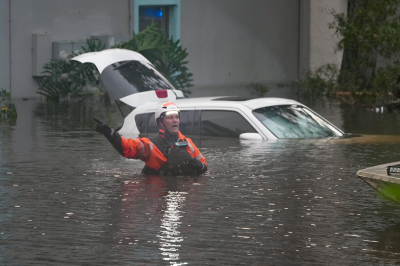My church was directly hit by Hurricane Milton. What I learned

Floridians are a tough bunch. Hurricanes happen. We prepare for them and know how to weather storms. But two back-to-back major hurricanes in as many weeks is a lot, even for the most grizzled local. Helene brought a record surge to our coastal community, and Milton was a nasty wind event. I rode out both storms.
Milton’s eye passed through my neighborhood, and the backside of the eyewall was like nothing I’ve experienced in previous storms. My church, West Bradenton, responded immediately. Here’s what I’ve learned from the past few weeks.
The flight, fight, and freeze responses are unavoidable. People react differently to an acute crisis. My church started serving the neighborhood at first light after the storm. We focused on the most desperate first. One home had been split in two by a large tree, and I was expecting the possibility of finding someone who had passed away. A shirtless gentleman approached us.
“Are you the homeowner?”
“Yes.”
“Are you ok?”
“I’m fine.”
“How did you manage the storm?”
“I slept through the whole thing,” he laughed. “But there was a lot of alcohol involved!”
You must minister to people where they are, which includes a host of factors — geography, socioeconomics, language, and emotions. When someone is experiencing a fight, flight, or freeze response, often the most important variable for ministry is their emotional state.
Most of the recovery work is done by locals. The running joke around here is true. Waiting for a hurricane is like being stalked by a turtle. But once the storm passes, everything happens fast. In an area like Bradenton, our grocery and hardware stores will be restocked before the supplies you ship arrive. Some of our stores run on generators and are open when the power is out. The first boots on the ground are locals. Our county “first-in” team did a phenomenal job clearing roads. It was local men and women who stepped up. Locals chainsaw and deliver generators. Locals pull carpet and cut drywall. One of the best ways to support disaster relief is to give monetarily to a local church that is doing the work. We burn through cash more than anything else.
There is always that one thing you need that no one can get to you. Following Milton, our biggest issue was finding gas to power generators and chainsaws. We had water. We had food. What we needed was gas. People were camping at gas stations waiting. Fuel lines were miles long. My favorite non-profit organization — One More Child — made emergency shipments to us. Fuel supplies are not what they do, but they understood the crisis and responded. We were rationing half gallons to keep medical equipment running for people with life-threatening conditions. Thankfully, our Governor opened supplies just in time. I don’t want to overdramatize what was happening, but I believe we were mere hours away from a complete societal meltdown.
The hardest internal work is controlling anger. The church steeple is blown apart. The fellowship hall roof almost collapsed. There are 34,506 leaks in the education building. Your best chainsaw threw a blade, and we can’t find a replacement. People from outside organizations call and say they can send help. They don’t show. The frustration quickly turns to anger. Perhaps this anger is justified. You can lead from a place of anger. But it does not take much for justified anger to turn toxic. Channeling the emotion of anger into positive energy is one of the hardest parts of leading during a crisis.
Old school is the best approach to communications, operations, and supply chains. Cell phone service was spotty. Severed fiber optic lines meant Wi-Fi was hard to find. Power was out for a week. We managed about 200 volunteers who responded to hundreds of requests for help. After this storm, we are investing in GMRS receivers and other equipment that does not require power, cell towers, and Wi-Fi.
The media is hit-or-miss with coverage of these storms. Not every hurricane is a news event. A small Cat 1 storm is like an afternoon thunderstorm, but the media would make you believe it’s a buzzsaw barreling through the entire state of Florida. Most national news outlets have not researched evacuation zones and understand who should leave and who should stay. In many cases, it’s more dangerous to leave than to stay due to gas shortages on limited routes north. Climate change stories are abundant, but we need more stories on insurance problems, the best ways for the federal government and non-profit disaster relief organizations to respond, and the locals who work tirelessly to rebuild their communities. And I wish we could give non-stop coverage to the good people of Appalachia until every single issue is resolved for them.
I’ve learned a few things from this storm. West Bradenton will be even more equipped to respond when a future storm hits. I’m grateful to serve with amazing people who didn’t stop until everyone who needed help received it.
Originally published at Church Answers.
Sam Rainer is president of Church Answers and pastor at West Bradenton Baptist Church in Florida.





















